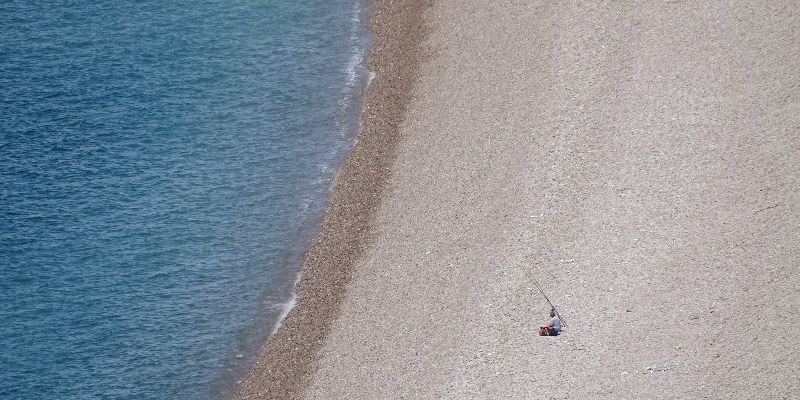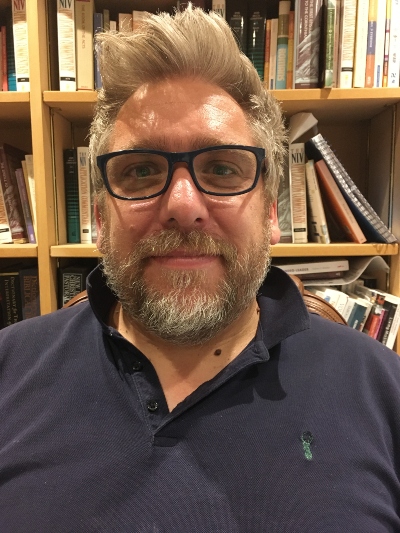A wild way
We are moving into a new way of being church - missional listener Ben Lucas offers questions and waymarkers from his journey to help us reflect on our own contexts

I have a favourite walk. I have walked it so many times. It begins at the cricket club I used to captain in Abbotsbury, takes you up to St Catherine’s chapel, a now deserted church on top of the hill, then down to the incredible Chesil beach with its views across the Jurassic coast. It is simply stunning.
I walked that walk at the beginning of lent with an Anglican pioneer, together praying about how we might see a pioneering movement break out across Dorset. It was a beautiful conversation in an extraordinary part of God’s world. Because of lockdown, I was unable to walk this path for a few months.
Returning in June, it was halfway through that I remembered the conversations of pioneering. I sensed God tell me to look around, and to look carefully. I realised that this beautiful walk was now even more beautiful, filled with nature, overgrown hedge rows, swarming with butterflies and bees. It was now both beautiful and wild. It had not been touched, been allowed to grow freely, and the result was incredible wild beauty where old plants had found their way back to the surface, and wildlife had returned and become more numerous.
My walk is not the only such illustration. Fish have been seen in the canals in Venice for the first time in ages, a tourist beach in Mexico has seen animals return (a turtle laying 112 eggs in front of a luxury dormant hotel), the birds in Wuhan can be heard for the first time – and even outside our front doors we see more butterflies and bees than we have in years. This is not new news for the Knepp estate in Sussex, which in the year 2000 embarked on a remarkable project to rewild. Theirs is a story of how a land was renewed and regenerated in extraordinary ways, by doing little except listening, learning, and enabling nature.
If taking our hands-off creation leads to a rewilding of our land – what might it look like if we took our hands off the church? What if we let go of control? What if, as leaders, we stopped strategizing and just helped people to experience the presence of God, and then enjoy what arises from such encounters?
I have been heartbroken in many church conversations regarding the coronavirus. I have heard that all know the real-life struggles people are going through – depression, loneliness, sickness, anxiety – but the main of the discussion is how do we continue to keep the show on the road. How do we continue to preach, sing songs, break bread, gather together etc…?
Whereas, I would humbly suggest that better questions might be:
-
What is the cry of the community at this time?
-
What would it be like if God’s kingdom came now?
-
What does the biblical imagination have to say to the situation?
-
And finally, what might church look like as we answer the previous questions?
The answers will be different and diverse in every locality. The answer is likely to be beautifully wild!
I have been on the most exciting but difficult ride as I have transitioned from Baptist minister of a pretty big, institutional Baptist church to a missional listener, whose role is simply to hang around rural Dorset asking those questions. I am not suggesting everyone needs to be missional listeners, or that my approach is right – but I do think it is helpful to offer others waymarkers of the journey I and other pioneers have been on. We have already begun a journey away from what was to something new. These waymarkers are not for everyone, may happen in a different order but could be helpful to reflect upon as we all step into the unknown of the new normal of what it means to be church.
1). Realisation – as beautiful church is, and as amazing as some parts of it can be – there is more for us and for the community. That people are desperate for radical community.
2). New set of questions – instead of looking at how do we attract? How do we do what we do now better? – we engage with new questions, like those mentioned earlier.
3). Wrestling with the powers – what God call us to do is a bit like Noah’s ark! It looks really odd to everybody else. People will try to control and reign us in – but somehow by the grace of the Holy Spirit and strength of character you continue.
4). Change of posture – instead of approaching God with full hands asking for blessing on our endeavours, we come with empty hands, seeking to join in with Him. Instead of approaching our neighbour as a missional target we want to grab and bring to where we are, we see them as missional conversation partner, whom as we journey together we realise they are discipling us, and we may be given permission to disciple them.
5). Increased attentiveness – transformation in our missional lenses leads us away from big events and pre packaged discipleship courses to noticing how to join in with God in the everyday.
6). Spiritual framework – we become reliant not on others feeding our souls but discover our own rhythms of grace that build us up and helps us to join in the reconciliation of all things.
7). Home and then Home again… we realise that, somehow, we are more aware of who God is, and who we are in Him and what He is doing in our communities. This feels like home, and in living there we help others discover their homes and a radical movement breaks out…
We are moving into a new way of being church, and I am excited – though this excitement is tempered by my biggest fear that we go back to how it’s always been done. If we can take are hands off the church, realise that God is calling us to a new thing which is join in with Him, rather than control – may my walk that day in Dorset become true for the church – rediscovery of wild beauty, the move of the Holy spirit and the good news that offers to the poor.
May new diverse communities rise up – and together as one Baptist movement, we celebrate, learn and grow; and may, because of the way our movement lives out Her call – may many experience the peace of God that is beyond our very imagining.
Chesil Beach image | Belinda Fewings | Unsplash
 Ben Lucas was the minister of a large Baptist church before moving to rural Dorset in 2017. He and is family are living incarnationally, engaged in missional listening.
Ben Lucas was the minister of a large Baptist church before moving to rural Dorset in 2017. He and is family are living incarnationally, engaged in missional listening.
This reflection appears in the Autumn 2020 edition of Baptists Together magazine